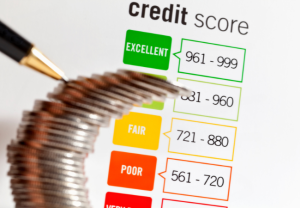Improving your credit score is crucial for achieving financial success. Whether you’re planning to apply for a loan, rent an apartment, or secure favorable interest rates on credit cards, having a good credit score can make all the difference. Fortunately, there are several strategies you can implement to boost your credit rating and strengthen your financial standing.
Key Takeaways:
- Implement strategic methods to pay off credit card balances
- Request higher credit limits to lower your credit utilization
- Become an authorized user on a credit card with a good payment history
- Ensure timely bill payments to avoid negative impacts on your credit score
- Take advantage of credit-building opportunities such as secured credit cards and reporting rent and utility payments
Strategically Pay Off Credit Card Balances
One effective strategy for improving your credit score is to strategically pay off your credit card balances. Your credit utilization, which is the portion of your credit limit you’re using, is a significant factor in determining your credit score. It is recommended to use less than 30% of your credit limit on any card, with lower utilization being better.
Paying down your balance before the billing cycle ends or making multiple payments throughout the month can help keep your utilization low. By doing so, you are reducing the amount of credit you are utilizing, which signals responsible credit management to lenders. Moreover, lowering your credit card balances can have a fast impact on your credit score, as the lower utilization is reported to the credit bureaus.
“Paying off credit card balances strategically and maintaining a lower utilization rate demonstrates financial responsibility and can help improve your credit score.”
By paying off your balances in a timely manner, you are not only reducing your credit utilization but also establishing a positive repayment history. Consistently paying your credit card bills on time shows lenders that you are reliable and capable of managing credit responsibly, which can further improve your creditworthiness.
Tracking Your Credit Utilization
It is important to regularly monitor your credit utilization to ensure you are staying within the recommended limit. This can be done by checking your credit card statements or using online banking tools provided by your credit card issuer. By keeping a close eye on your credit card balances, you can make necessary adjustments to maintain a lower utilization rate and improve your credit score over time.
The Impact of Paying on Time
In addition to paying off your credit card balances strategically, it is crucial to make all your payments on time. Late payments can have a detrimental effect on your credit score, as they are reported to the credit bureaus and remain on your credit report for years. Setting up reminders or automatic payments can help ensure that you never miss a payment and maintain a positive payment history.
By employing these strategies and effectively managing your credit card balances, you can lower your credit utilization, establish a positive repayment history, and ultimately improve your credit score. Stay committed to responsible credit management, and you will see your creditworthiness grow over time.
Ask for Higher Credit Limits
One effective way to improve your credit score is to ask your credit card issuer for a higher credit limit. By increasing your credit limit while keeping your balance the same, you can lower your overall credit utilization ratio. This ratio, which measures the amount of credit you’re using compared to your total available credit, is an important factor in determining your credit score.
When you have a higher credit limit, your credit utilization ratio decreases because you’re using a smaller percentage of your available credit. This can positively impact your credit score and show that you are responsibly managing your credit.
To request a higher credit limit, contact your credit card issuer and inquire about the possibility. Some credit card issuers may have specific criteria or requirements for increasing credit limits, so it’s important to understand their policies. It’s also a good idea to inquire about any potential fees or restrictions associated with a higher credit limit request.
It’s worth noting that requesting a higher credit limit may result in a “hard” credit inquiry, which can temporarily lower your credit score. However, this impact is usually minimal and short-lived, making it a worthwhile trade-off for the potential long-term benefits of a higher credit limit.
Benefits of a Higher Credit Limit
Having a higher credit limit offers several advantages:
- Better credit utilization: A higher credit limit can lower your credit utilization ratio, which is a key factor in credit scoring models. As mentioned earlier, a lower utilization ratio can positively impact your credit score.
- Increased purchasing power: With a higher credit limit, you have more flexibility to make larger purchases or handle unexpected expenses when needed.
- Improved creditworthiness: Lenders and creditors view individuals with higher credit limits as financially responsible and capable of managing their credit effectively. This can enhance your overall creditworthiness and increase your chances of qualifying for loans, mortgages, or other credit products in the future.
It’s important to remember that having a higher credit limit doesn’t mean you should increase your spending. It’s crucial to maintain responsible spending habits and avoid using your credit card to its full limit. Utilize your higher credit limit wisely and continue to make timely payments to further strengthen your credit history and score.
Overall, asking for a higher credit limit can be a smart strategy for improving your credit score and financial standing. By effectively managing your credit utilization and demonstrating responsible credit behavior, you can work towards achieving a higher credit limit and reaping the associated benefits.
Become an Authorized User and Pay Bills on Time
Becoming an authorized user on a credit card with a good payment history can have a positive impact on your credit score. By being added to an account as an authorized user, you can benefit from the account’s high credit limit and history of on-time payments. This positive information will be included on your credit report, potentially boosting your credit score. It’s important to ensure that the credit card account reports to all three major credit bureaus to maximize the effect on your score.
In addition to becoming an authorized user, paying your bills on time is crucial for improving your credit score. Late payments can have a significant negative impact on your credit reports, staying on record for up to seven years. Make it a priority to pay your bills on time and consider setting up reminders or automatic payments to avoid any missed payments. By consistently making on-time payments, you demonstrate your creditworthiness and responsibility, which can positively affect your credit score.
To summarize, becoming an authorized user on a credit card with a good payment history and paying your bills on time are two effective strategies for improving your credit score. By leveraging the positive information from an authorized credit card account and consistently making on-time payments, you can work towards building a solid credit history and achieving a higher credit score.



